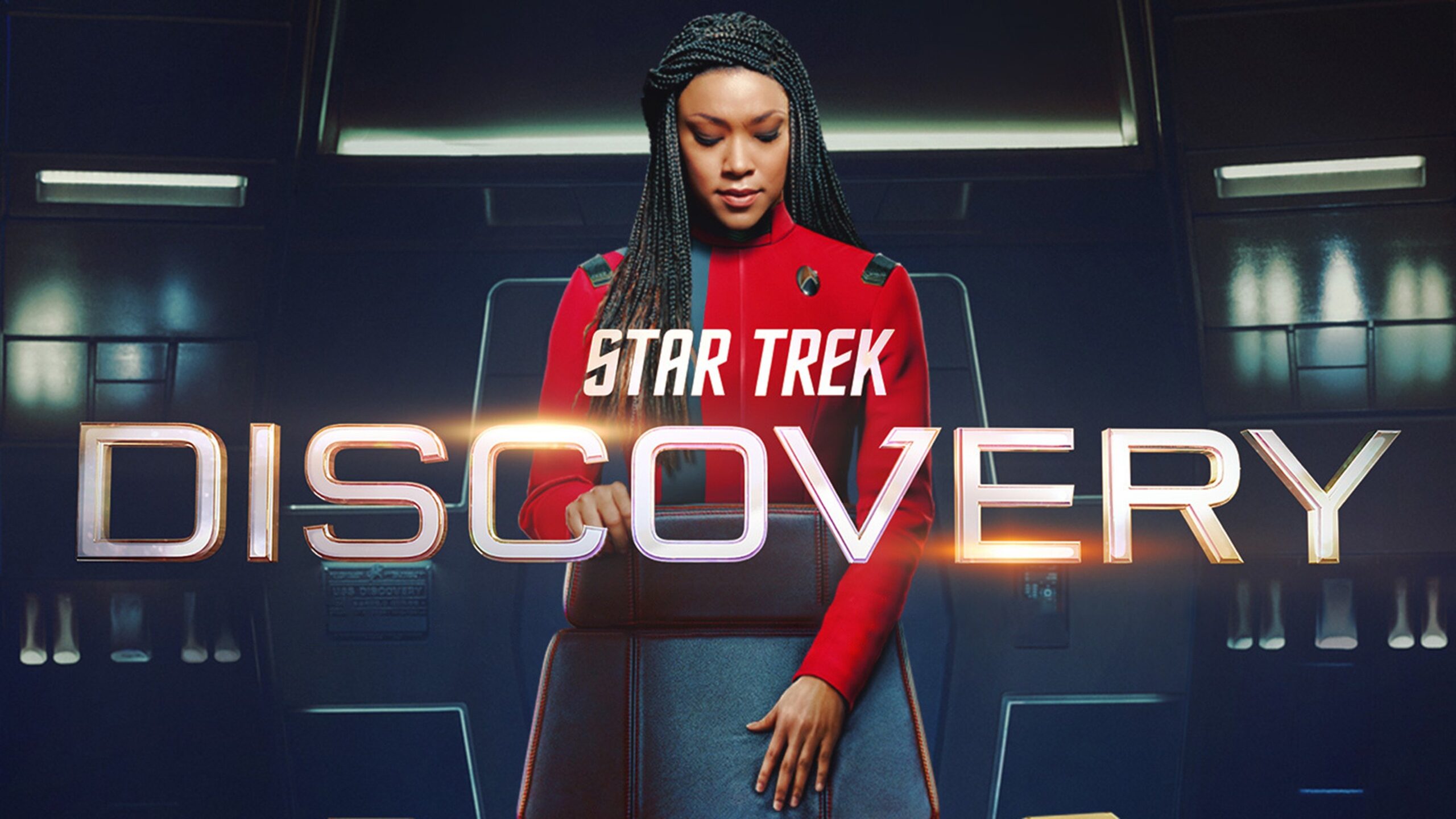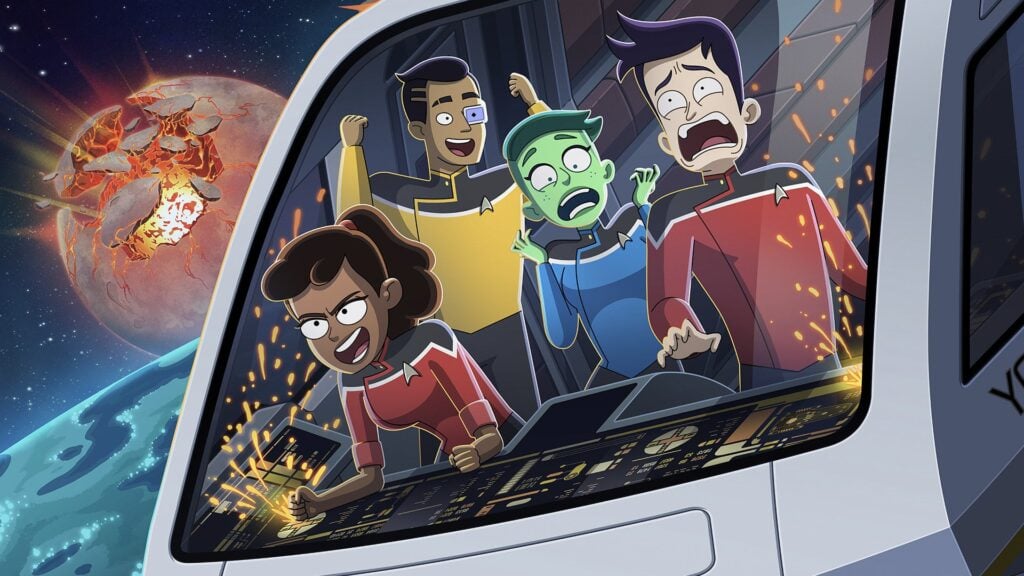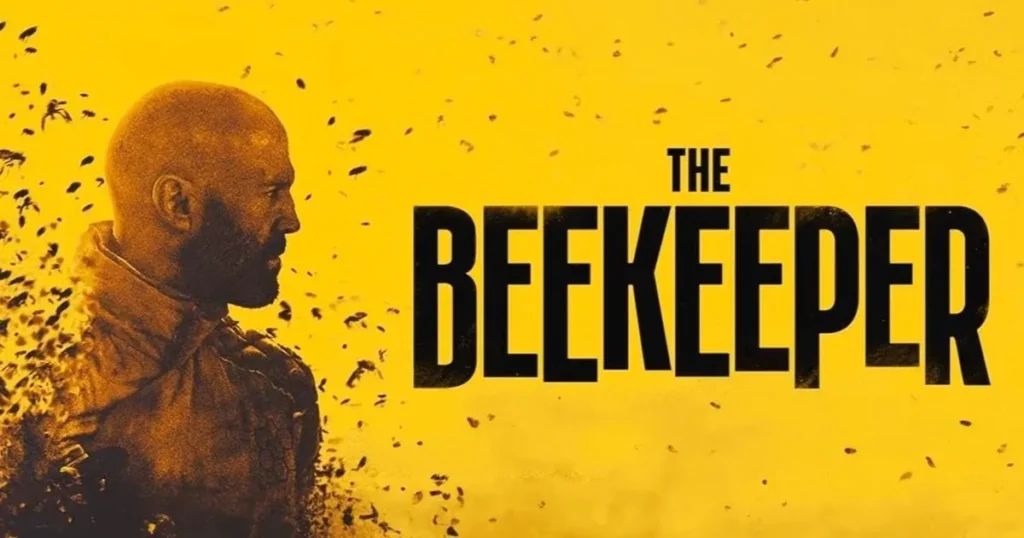This fourth season of Star Trek: Discovery seems directly inspired by the pandemic but at times fails to realize that the previous season had covered much of the same ground in more organic fashion.
The Production: 3.5/5
Star Trek: Discovery is a show where each season seems to contain some of the very best and some of the very worst moments in its canon, and the fourth season continues this pattern. While some critics have pounced on the show, every aspect of this season can be found to share roots with Roddenberry’s original series. It is worth mentioning right at the start that this season was wholly created during the covid-19 pandemic, with production taking place during the earlier part of the pandemic before the arrival of vaccines and treatments. On one of the bonus features, a producer notes that looking at the finished footage, it’s impossible to tell what their limitations were; while that may be true from a technical perspective, many of the choices made on the show this season seem to reflect the reality of working and living in that environment. While the previous season seemed to comment perfectly on the sense of disconnection that the pandemic spread in real life, that was more coincidence than intention as the pandemic had not begun when the third season was in production. This fourth season seems more directly inspired by the pandemic but at times fails to realize that the previous season had covered much of the same ground in more organic fashion.
When we last left the crew of Discovery at the conclusion of season three, the crew had just completed a triumphant mission that restored a fallen Starfleet back to its heroic status after over a century of disarray. The ending of that season promised that the next adventure would be Discovery using its unique capabilities to bring much needed fuel across the galaxy. This was a fantastic premise, for it invited the normally serialized series to lower the stakes a bit, explore the galaxy further, and give room for additional character beats with members of the supporting cast. Indeed, the season begins in breathtaking fashion, with Captain Michael Burnham (Sonequa Martin-Green, in excellent form as always) and her partner Book (David Ajala, doing the best he can with frequently uneven and repetitive material) visiting a strange new world to bring a gift of dilithium to untrusting natives. Had the season continued in this fashion, it would have been one for the ages. Instead, after this incredible opening, the ship is called back to the Federation to assist in understanding yet another unstoppable, Universe-threatening mystery that only Discovery can solve.
As in previous seasons, all of the work Captain Burnham has done to prove herself means nothing to the latest higher-up (this time, the Starfleet president, played by Chelah Horsdal doing the best she can with flat writing), forcing Burnham to both solve the mystery and prove herself by going through a number of character beats that have already been played out in previous seasons. This mystery will ultimately drive a wedge between Burnham and Book, undoing a relationship that was one of the high points of the previous season. Longtime cast members are often given precious little to do, in favor of larger performances from recurring guests like Oded Fehr (excellent as Statfleet’s head admiral), David Cronenberg (surprisingly tender as a mysterious higher-up), and Shawn Doyle (like so many others, doing the best he can with an underwritten and overextended role as one of the main villains).
Let’s first look closer at what works during this season. To begin with, production values and performances remain top notch; this is a beautiful looking show with designs that rival the most expensive space movies. The season-opening adventure sequence, as noted above, is genuinely thrilling: a pitch-perfect blend of exploration, altruism and humor. When supporting characters are given a chance to step into the limelight, the results are so good that one wonders why they’re not given more to do. And the revelation that the phenomenon putting the Federation at risk was not a naturally occurring phenomena, but rather an unknown species taking actions that were not understood to be harmful, a very Trek-like trope that’s used well here. What’s most exciting about the season is the idea that there could be intelligence out there in the universe that aren’t humanoid at all, and that the search for common ground and understanding would take more effort than simply using a universal translator to discuss a problem with aliens that are obviously human actors in makeup. For all of the season’s shortcomings, the main idea is a good one, and that leads to a final stretch of episodes that are more satisfying than expected.
What doesn’t work as well? As mentioned earlier, there’s a lot of repetition from previous seasons of storylines that seemed resolved or played out. The show simply didn’t need another running plot about whether Burnham is suited to the captain’s chair; it retreats ground that had already been covered, to diminishing returns. Season 3 ended with an interesting possibility of friction between normally harmonious characters, with engineer Paul Stamets (Anthony Rapp, who brings warmth to even the grouchiest moments) resenting Burnham for making a necessary command decision that put his family at risk. An exploration of the responsibilities of duty conflicting with the demands of friendship would have been fertile ground to explore, but this plot point is quickly dispensed with. Tilly (Mary Wiseman, a welcome burst of energy) is now a lieutenant and though she’s climbing the ladder as she’s always wanted, she’s suddenly not sure if it’s the right path for her. Unfortunately, this leads to a confusing and seemingly incomplete storyline where her character leaves the ship, though there is no real-world indication that the actor has left the show. Similarly, a lot of time in the previous season and the beginning of this one is spent on Gray (Ian Alexander, luminous in a thankless role) getting his own body after being forced to share one with his romantic partner, Adira (Blu del Barrio, playing the Wesley Crusher role, which I mean in the best possible way). Gray gets his own body at last, and then… leaves the ship. As with Wiseman, there is no indication that Alexander has left the cast, making the choice to write the character out of the second half of the season a bit of a head-scratcher. Perhaps worse, the character of Book is turned from a romantic partner into a villain. On the bonus features, Martin-Green speaks eloquently about the importance of showing healthy romantic relationships between Black people on television, which makes the decision to blow up their relationship even more of a head-scratcher. Doug Jones continues his excellent portrayal of the alien Saru, but his character is often relegated to the sidelines. Wilson Cruz’s sympathetic Hugh Culber spends most of his time reacting rather than getting to show agency. Tig Notoro’s pithy Jett Reno is always a welcome presence, but she’s only given one note to play here. One can’t help but wonder if there were perhaps covid-related production concerns that limited the availability of the actors; perhaps there was a production issue that the writers were trying to cover.
Still, the highs and lows of Discovery’s fourth season are wholly consistent with those of Roddenberry’s original series. This season invokes original series high points like “Where No Man Has Gone Before” and “The Immunity Syndrome,” but also low points like “The Omega Glory.” Anyone turned off by this season’s often obvious parallels to present day problems can be forgiven for wishing this season provided more escapism than reminders of real world troubles. However, that sort of blunt, lets-hit-the-audience-over-the-head-with-the-metaphor type of writing has always been present in Trek, nevermore so than when Roddenberry’s pen was the one doing the work. Fans can be quick to forgive or forget that the original series had several episodes with eye-rolling moments like Kirk clutching an American flag while reading the Declaration of Independence to a savage alien race, or Spock referencing the Vietnam War in response to skirmishes between actors donning vaguely ethnic-styled makeup. If Discovery isn’t everyone’s cup of tea for these reasons, I feel it’s worth pointing out that the elements most objected to on this series have been right there from the start of the franchise. What the show runners are aiming for is a vision of a future with room for everyone, where diversity and inclusion are celebrated rather than feared, and where the conflicts of yesterday still leave room for the hope of reconciliation tomorrow. If this season’s reach exceeds its grasp, it is at least trying to fulfill Trek’s core premise as it applies Roddenberry’s vision to our present day reality.
This season was a thirteen episode affair, and there are times (particularly when rewatching the season over a shorter period of time) where it feels as if the story constructed for the season simply wasn’t large enough to cover the number of episodes they were committed to delivering. There are also times where the overarching story doesn’t blend as well with episodic detours taken; when we’re told over and over that the fate of the galaxy is at stake, it becomes harder to care about side stories that divert attention from that threat. With the upcoming fifth season set to reduce the number of episodes to ten, I am optimistic that the show still has a bright future to look forward to. Many of the issues I have pointed out in this review might not have stood out as much had there been less time to fill.
Video: 4.5/5
3D Rating: NA
Season 4 of Star Trek: Discovery is presented in an aspect ratio of 2.40:1, in a presentation that is faithful to its original airing on Paramount+. I am fortunate in that my internet bandwidth was sufficient to enjoy a quality presentation during the show’s streaming run, leaving me with no complaints during that time. As such, the disc presentation mostly mirrored what I saw then, though viewers with lesser internet connections may experience a greater improvement viewing the disc. Black levels are strong (important for a show with a significant amount of space scenes), and fine detail is present in abundance. There are multiple moments where it is all but impossible to tell the difference between a well-executed special effect and a cutting-edge practical one. In the interest of full disclosure, I did notice several fleeting moments during the original broadcast where it seemed an effects render wasn’t as detailed as one might expect, and those same minor imperfections have carried over to the disc. However, most viewers (especially those viewing on flat panels rather than projection screens) will be hard pressed to notice.
Audio: 5/5
The 5.1 audio track, the same mix offered with the streaming presentation, is presented here in the lossless DTS-HD MA format. Dialogue is mostly presented through the center channel and always clearly intelligible, with Jeff Russo’s score taking ample advantage of the surrounds. The audio design of the season’s big action beats rivals that of a high budget feature film, with explosions and environmental effects placing the viewer in the center of the action. There are also several moments where the sound designers play on the contrast between bombast and silence to accentuate a moment, a choice that is very effective.
Special Features: 4.5/5
Season 4 of Discovery comes with several deleted scenes and featurettes of varying lengths, as well as an audio commentary on the season finale. The material is surprisingly in-depth, with cast and crew revealing a surprising amount of detail about themselves and the struggles they faced. All bonus features, including the season’s lone audio commentary, include subtitles.
Disc 1:
Deleted Scene from Episode 4×03 (2:16) – An extended version of Gray’s ritual and a deleted scene with Culber talking to Stamets afterward; the episode is better without them.
The Toll It Took (11:51) – The cast and crew discuss coming back to work during the earlier part of the covid-19 pandemic. This featurette emphasizes how difficult working conditions were at a time when in-person gatherings were limited by necessity.
Disc 2:
Deleted Scene from Episode 4×05 (1:25) – Stamets and Suru have an extended heart-to-heart.
Disc 3:
Deleted Scene from Episode 4×11 (0:26) – A brief trim from one of the episode’s montages.
Disc 4:
Audio Commentary on Episode 4×13 with Michelle Paradise, Olatunde Osunsanmi, Sonequa Martin-Green and David Ajala – The participants watch the episode together (remotely on a Zoom call, from the sound of it). The camaraderie is good (if a little self-congratulatory), and there are some tidbits not covered in other bonus features.
Being Michael Burnham: The Captain’s Log (14:22) – Sonequa Martin-Green is front and center in this unexpectedly candid featurette about her character’s journey and her own.
Creating Space (19:37) – A featurette about how season 4 of Discovery has incorporated the LED screen augmented reality technology that has become widely used in similar productions, informally known on this production as the holodeck. The possibilities the technology offers are undeniable, though I couldn’t help but notice a sameness in shots and staging in its repeated use.
The Voyage Of Season 4 (52:25) – A pretty in-depth look at the character journeys and story arcs over the course of the season, featuring both cast and crew. At times, there’s some distance between what showrunner Michelle Paradise said the intention behind a character or storyline was and what actually came across in the show.
Gag Reel (2:47) – The cast has such great chemistry and it looks like they’re having so much fun here; I wish the season’s storytelling would have allowed for more of this lightness to show through.
Overall: 4/5
Star Trek: Discovery’s fourth season has some great moments of emotional depth and science-fiction exploration that make it worthy of its audience’s time. Still, there are too many moments where the show retreads ground it had previously and more effectively covered in earlier seasons, as well as some baffling choices to sideline some of its most endearing cast members for reasons that don’t pay off in the storytelling. Though the season itself had its ups and downs, the disc release from CBS is of uniformly high quality, with an outstanding audio and visual presentation and a surprisingly in-depth set of bonus features. Recommended, particularly for fans of the show.
Josh’s fate as a physical media enthusiast was probably sealed the moment he figured out how to operate a top-loading VCR before he even knew how to walk. Since graduating with a degree in film production, he has enjoyed a career focused on the archival and distribution side of film and television. These days, Josh thinks of himself as a proud father of twins first. He would like to thank his wife for her unwavering support, and for every typo she’s ever caught.
Post Disclaimer
Some of our content may contain marketing links, which means we will receive a commission for purchases made via those links. In our editorial content, these affiliate links appear automatically, and our editorial teams are not influenced by our affiliate partnerships. We work with several providers (currently Skimlinks and Amazon) to manage our affiliate relationships. You can find out more about their services by visiting their sites.








Similar threads
- Josh Steinberg
- TV on DVD and Blu-ray
2